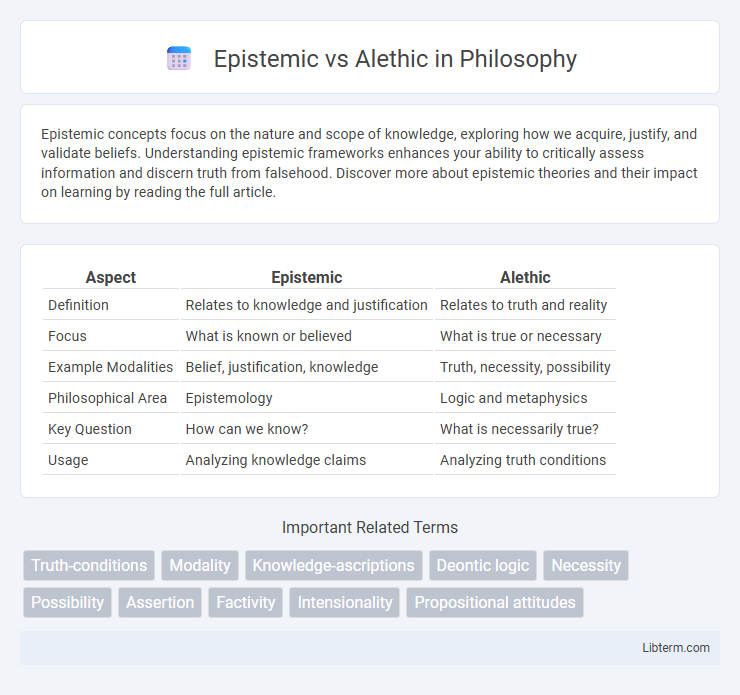Epistemic concepts focus on the nature and scope of knowledge, exploring how we acquire, justify, and validate beliefs. Understanding epistemic frameworks enhances your ability to critically assess information and discern truth from falsehood. Discover more about epistemic theories and their impact on learning by reading the full article.
Table of Comparison
| Aspect | Epistemic | Alethic |
|---|---|---|
| Definition | Relates to knowledge and justification | Relates to truth and reality |
| Focus | What is known or believed | What is true or necessary |
| Example Modalities | Belief, justification, knowledge | Truth, necessity, possibility |
| Philosophical Area | Epistemology | Logic and metaphysics |
| Key Question | How can we know? | What is necessarily true? |
| Usage | Analyzing knowledge claims | Analyzing truth conditions |
Introduction to Epistemic and Alethic Modalities
Epistemic modality expresses degrees of knowledge, belief, or uncertainty, indicating how likely or certain a statement is from the speaker's perspective. Alethic modality, on the other hand, relates to the necessity, possibility, or impossibility of propositions based on logical or metaphysical grounds. Understanding the distinction between epistemic and alethic modalities is essential for analyzing how language conveys different types of modality in philosophy and linguistics.
Defining Epistemic Modality
Epistemic modality expresses degrees of certainty, belief, or knowledge about a proposition, indicating how likely or true the statement is from the speaker's perspective. This modality uses linguistic markers such as modal verbs ("might," "must," "could") to convey possibility, necessity, or probability based on available evidence or reasoning. Unlike alethic modality, which relates to logical necessity or possibility independent of knowledge, epistemic modality centers on the speaker's assessment of truth conditions and knowledge states.
Understanding Alethic Modality
Alethic modality centers on the nature of truth, necessity, and possibility regarding statements about reality, distinguishing what must be true, what can be true, and what cannot be true. It encompasses concepts such as logical necessity, metaphysical necessity, and logical possibility, providing a framework for analyzing the truth conditions of propositions independent of belief or knowledge. Understanding alethic modality is crucial for fields like philosophy, formal logic, and linguistic semantics, where modalities express essential distinctions about truth rather than epistemic states.
Key Differences Between Epistemic and Alethic
Epistemic modality relates to knowledge, belief, or degrees of certainty about a proposition, often expressing how likely or justified a statement is based on evidence or reasoning. Alethic modality concerns necessity and possibility grounded in logical, metaphysical, or physical truth, focusing on what must be true or could be true regardless of human knowledge. The key difference lies in epistemic modality evaluating statements through an agent's knowledge perspective, while alethic modality assesses statements based on intrinsic truths independent of belief.
Linguistic Markers of Epistemic and Alethic Modalities
Linguistic markers of epistemic modality include modal verbs like "might," "could," and "must," which express degrees of belief or knowledge about the truth of a proposition. Alethic modality is indicated by terms such as "necessarily," "impossible," and modal verbs like "must" when used to express logical or metaphysical necessity. Distinguishing these modalities relies on context, as epistemic markers reflect uncertainty or evidence, while alethic markers denote absolute or logical necessity.
Examples of Epistemic and Alethic Usage
Epistemic modality expresses knowledge, belief, or degrees of certainty, as in the sentence "She might be at home," indicating possibility based on evidence or inference. Alethic modality deals with necessity, possibility, or impossibility concerning facts or logical truths, exemplified by "A triangle must have three sides," reflecting an objective truth. These distinctions illustrate how epistemic usage centers on the speaker's knowledge state, while alethic usage relates to universal or logical necessity.
The Philosophical Significance of Each Modality
Epistemic modality concerns knowledge and belief, framing statements in terms of what is known or believed to be true, thus playing a crucial role in the analysis of justification and evidence in epistemology. Alethic modality, dealing with necessity and possibility, underpins metaphysical discussions about what must be the case versus what could be, shaping debates on the nature of reality and logical consequence. The philosophical significance lies in how epistemic modality informs theories of knowledge and certainty, while alethic modality grounds discussions of metaphysical necessity and logical truth.
Challenges in Distinguishing Epistemic from Alethic
Distinguishing epistemic modality, which relates to knowledge and belief about possibility or necessity, from alethic modality, which concerns objective necessity and possibility tied to truth, poses significant philosophical challenges. The overlap in linguistic expressions, such as modal verbs and adverbs, creates ambiguity in discerning whether a statement reflects subjective uncertainty or objective metaphysical status. This complexity impedes clear semantic analysis and complicates modal logic frameworks aiming to separate knowledge-based modality from truth-based necessity.
Applications in Logic and Linguistics
Epistemic modality in logic and linguistics relates to knowledge, belief, or degrees of certainty, guiding expressions about what is known or inferred, such as "It might be raining." Alethic modality concerns necessity and possibility in terms of truth and logical relations, handling statements like "It must be true" or "It is possible." These distinctions apply in formal semantics to analyze modal operators, influence proof theories, and shape natural language interpretation in both philosophical logic and computational linguistics.
Conclusion: The Importance of Modal Distinctions
Understanding the distinction between epistemic and alethic modalities is crucial for precise communication in logic and philosophy. Epistemic modality relates to knowledge and belief about possibility and necessity, while alethic modality concerns objective truth conditions such as metaphysical, logical, or physical necessity. Recognizing these differences enhances analytical clarity in argumentation, supporting accurate interpretations of modal statements in diverse contexts.
Epistemic Infographic

 libterm.com
libterm.com